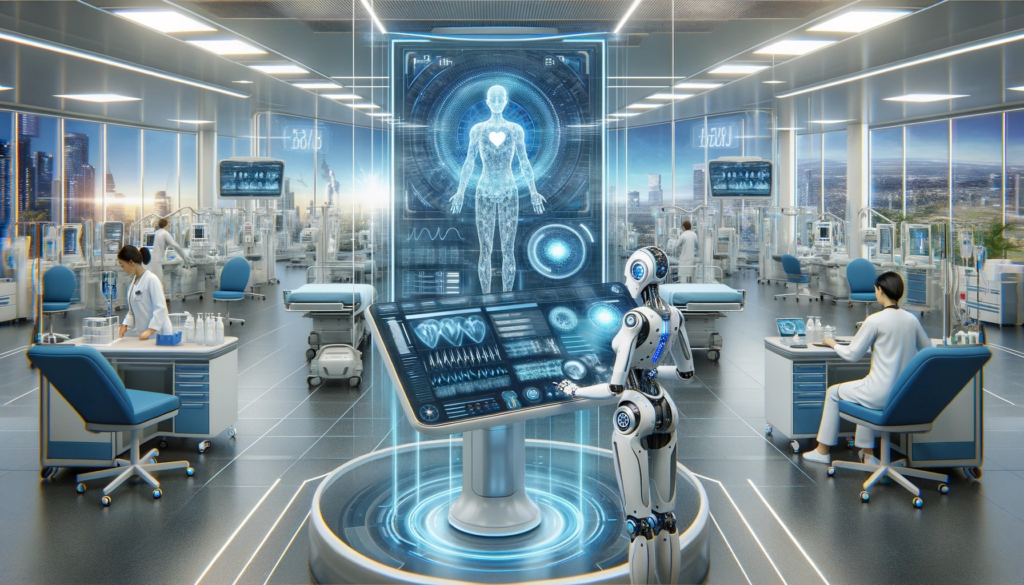Artificial intelligence (AI) has emerged as a transformative force in…well, pretty much everything. Where we are in five years is hard to predict, especially since the last three years alone have witnessed a sea change in AI use, availability, and applications.
Although every industry is likely to witness drastic change over the next decade, we’re looking specifically at the healthcare industry. AI is in the process revolutionising medical practices and improving patient experiences. The integration of AI, machine learning (ML), natural language processing (NLP), and deep learning (DL) has enabled healthcare stakeholders and medical professionals to identify healthcare needs and solutions with greater accuracy and efficiency. By analysing vast amounts of data, AI algorithms can uncover patterns and insights that are often undetectable by human capabilities alone. As a result, AI has the potential to reshape the landscape of medicine and deliver more precise and tailored healthcare services.
How AI Works in Healthcare

AI in healthcare operates by analysing extensive datasets stored by healthcare organisations, including images, clinical research trials, and medical claims. By applying AI algorithms, these datasets can be processed to identify patterns and gain insights that can inform medical and business decisions. ML and DL techniques allow AI to “learn” and recognize data patterns, while NLP enables algorithms to isolate relevant information. This fusion of AI technologies has had a significant impact on the healthcare industry, with the global market for AI in healthcare projected to reach $427.5 billion by 2032 — in other words, truly explosive growth.
The Benefits of AI in Healthcare
The integration of AI in healthcare offers numerous benefits for patients, healthcare providers, and researchers alike. Some of the key advantages include:
- Improved Diagnosis and Treatment: Algorithms can analyse patient data, medical records, and imaging results to aid in the diagnosis of diseases and the development of tailored treatment plans. By identifying patterns and correlations in data, AI can support healthcare professionals in making more accurate diagnoses and prescribing appropriate treatments.
- Increased Efficiency: Administrative tasks, such as scheduling appointments and managing patient records, can be time-consuming and tedious. AI can help by freeing up healthcare professionals to focus on direct patient care. AI-powered systems can optimise workflows and improve operational efficiency, reducing costs and enhancing patient outcomes.
- Faster Drug Development: We can expect AI to accelerate the drug discovery process by analysing large datasets and predicting drug efficacy and potential side effects. This enables researchers to design more effective clinical trials and bring new treatments to market more quickly. It can also help predict suitable drug candidates that researchers may not yet have thought of.
- Improved Clinical Trials: AI can help identify suitable candidates for clinical trials and predict patient responses to specific treatments. By analysing patient data and identifying biomarkers, AI can enable researchers to develop targeted therapies that are more likely to be successful in clinical trials.
- Enhanced Patient Safety: Patient safety is paramount in the medical industry, and anything done to mitigate risks is a step in the right direction. AI can assist in reducing medical errors and adverse events by identifying potential risks and alerting healthcare professionals to potential safety concerns. By analysing patient data, AI can help prevent harm and improve patient outcomes.
- Streamlined Administrative Workflow: AI and automation can perform mundane administrative tasks, such as accurate coding and information sharing between departments, freeing up healthcare workers’ time for other activities and improving overall workflow efficiency.
These benefits highlight the transformative impact of AI in healthcare, demonstrating its potential to revolutionise medical practices and improve patient care.
Use Cases of AI in Healthcare

AI has found numerous applications in healthcare, transforming various aspects of medical practices and patient care. Some of the notable use cases include:
1. Medical Imaging
Medical imaging has already proven to be one of the most valuable uses of AI in medicine so far. AI algorithms can analyse medical images, such as X-rays, CT scans, and MRIs, to assist in the diagnosis of diseases. By recognizing patterns and anomalies in these images, AI can support radiologists and other medical professionals in identifying conditions and planning appropriate treatment strategies.
For example, AI algorithms can detect lung nodules in CT scans, aiding in the early detection of lung cancer. AI can also analyse brain scans to identify brain tumours or assess the progression of neurodegenerative diseases like Alzheimer’s. Ophthalmology in particular has benefited from AI. AI systems have already proven to be effective in detecting retinal abnormalities and diseases, for example, often more effectively than trained professionals.
2. Personalised Treatment
AI can analyse patient data, including medical history, genetic information, and lifestyle factors, to predict disease risks and recommend personalised treatment options. By considering individual characteristics, AI algorithms can help healthcare professionals tailor treatment plans to specific patients, improving treatment effectiveness and patient outcomes. For example, AI can assist in selecting the most effective chemotherapy drugs based on a patient’s genetic information, optimising treatment outcomes.
3. Electronic Health Records (EHRs)
AI can streamline the management of electronic health records (EHRs) by analysing large volumes of data and extracting valuable insights. AI algorithms can identify patterns and trends in patient data, aiding in disease prevention, treatment planning, and predictive analytics. By analysing EHR data, AI can predict disease risks, identify potential adverse drug reactions, and support healthcare professionals in making informed decisions.
4. Fraud Detection
AI can play a crucial role in detecting fraudulent activities within the healthcare system. By analysing medical and billing data, AI algorithms can identify irregular patterns and anomalies that may indicate fraudulent claims or billing practices. This proactive approach helps prevent healthcare fraud, ensuring that resources are allocated to genuine patient care and reducing financial losses within the healthcare system.
5. Virtual Assistants and Chatbots
Medical establishments can be busy places, especially in rural or developing areas that are understaffed or underfunded. AI-powered virtual assistants and chatbots have become invaluable tools in delivering remote patient care and guiding individuals through their diagnoses. These intelligent systems provide personalised health advice, assistance, and appointment scheduling, alleviating the workload of healthcare professionals and enhancing patient satisfaction. Additionally, virtual assistants can help patients manage their medications, provide information on symptoms, and offer guidance on when to seek medical intervention.
6. Remote Patient Care
Remote medical care has come a long way since the pandemic, and the changes are here to stay. The kickstart to remote medicine is one of the silver linings of that difficult period. AI facilitates remote patient care by enabling real-time monitoring and treatment guidance regardless of the patient’s location. Wearable devices equipped with AI algorithms can continuously monitor vital signs, detect changes in health conditions, and alert healthcare professionals to intervene when necessary. Remote patient care offers convenience and accessibility, reduces hospital visits, and enables proactive healthcare management.
7. Medical Research and Data Analysis
With more data than ever before, analysts need powerful tools to parse it all. AI can accelerate medical research by analysing vast amounts of data, including patient records, clinical trial results, and genetic information. By identifying patterns and correlations in the data, AI algorithms can uncover insights that lead to more precise medical interventions and treatment strategies. This data-driven approach enhances drug development and clinical practices, improving patient outcomes.
8. Clinical Decision-Making Processes
AI supports healthcare professionals in making precise diagnoses and treatment decisions by analysing extensive patient data, including medical records, lab findings, and medical images. By identifying patterns and potential treatment outcomes, AI algorithms offer valuable insights that guide healthcare professionals in providing optimal care aligned with individual health conditions and needs.
9. Risk Prediction of Pandemic Preparedness
AI models have become valuable tools for studying the societal-scale effects of catastrophic events, such as pandemics. By leveraging large datasets and advanced algorithms, AI can create representations or simulations to predict how infectious diseases might spread across populations. This helps policymakers and healthcare organisations develop targeted preventive measures and response strategies, ultimately mitigating the impact of pandemics.
These use cases illustrate the diverse applications of AI in healthcare, highlighting its potential to transform medical practices, improve patient care, and advance medical research.
The Future of AI in Healthcare
The future of AI in healthcare is filled with immense potential for further advancements and innovations. As technology continues to evolve, AI algorithms will become even more sophisticated, enabling more accurate diagnoses, personalised treatment plans, and improved patient outcomes. The integration of AI with other emerging technologies, such as robotics and genomics, will further enhance the capabilities of healthcare systems.
AI-powered robotics can assist surgeons in performing complex procedures with greater precision and efficiency, reducing the risk of complications and improving patient recovery. Genomic analysis combined with AI algorithms can enable the development of personalised therapies and targeted treatments, revolutionising precision medicine.
Furthermore, the ethical and regulatory considerations surrounding AI in healthcare will become increasingly important. Striking a balance between data privacy, security, and the potential benefits of AI is crucial. Transparent and accountable AI systems will be essential to ensure trust and compliance with ethical guidelines.
The speed at which AI has developed is truly astounding, and its impacts on medicine are only beginning to be felt. With wise guidance and quality feedback systems in place, AI will grow into a powerful ally for the medical community, benefiting doctors and patients alike. To stay ahead of the curve, medical establishments will need to partner with AI experts to ensure their systems are as robust and trustworthy as possible. If that sounds like something you’re looking for, look no further. Cutting edge tech is why we’re here, and we’re happy to help push the boundaries into a bright new future. Reach out to us to discuss a project and we’ll make sure that you stay ahead instead of falling behind.







